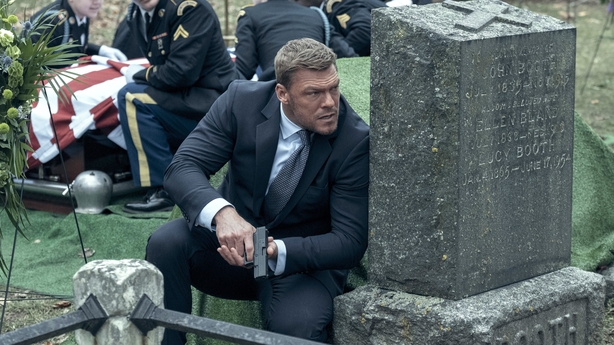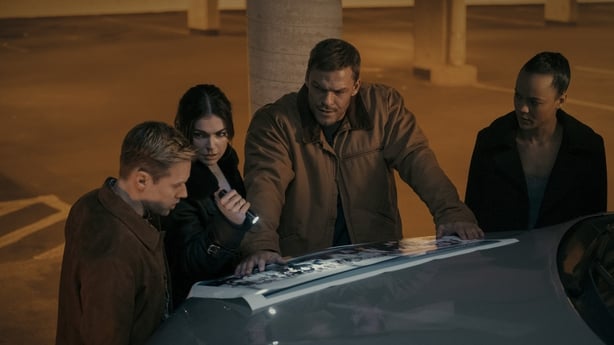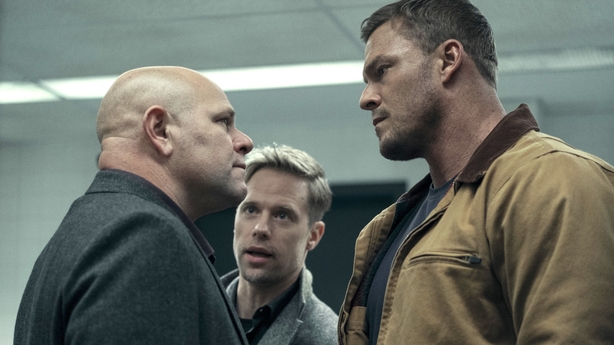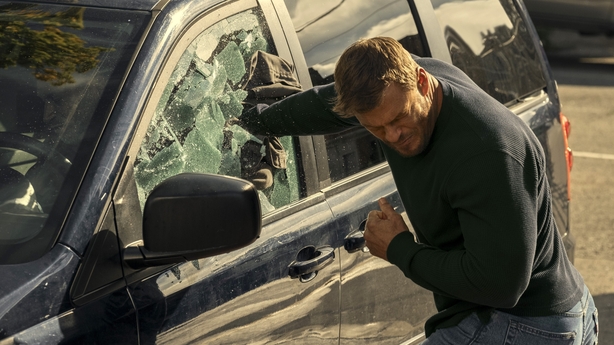The wait is over, Reacher is back on Prime Video, and author Lee Child reckons that season two is better than his iconic hero's much-loved streaming debut.
This time round, Jack Reacher, perfectly portrayed by Alan Ritchson, and his former military comrades are investigating the murders of friends from their old unit - and the winning mix of mystery, mayhem, moments of tenderness, and mirth are front and centre once again.
Indeed, Lee Child and co are so confident of the new season's success that work has already begun on season three.
The author and executive producer is giving nothing away about that, but as Harry Guerin discovers, he's happy to chat forever about season two - including "an insider secret"...
Harry Guerin: The first season of Reacher was based on your first Jack Reacher book, Killing Floor, but the second season jumps all the way to the eleventh Reacher book, Bad Luck and Trouble. At what point did Bad Luck and Trouble become True North for season two and what was it about it over some of the other classics that made you say, 'This is the book that's going to become season two'?
Lee Child: Think back to season one - what did it do? It introduced Reacher immediately after he left the army so that we saw Reacher becoming Reacher, learning how to live as Reacher. It had a lot of flashbacks to his family situation - his mother, his father, his brother. It was about Reacher the person. How did he get to where he is now?
And so, for the second season, we thought - because we hope that this will introduce Reacher to a wider audience even than the books - we need to cover all the bases. Having explained his personal history, now we need to explain his professional history. So we needed to find a book that was really meaty with the stuff that he used to do when he was a working soldier. And Bad Luck and Trouble seemed to be exactly the right one because that was the book where he set up the special unit, the 110th Special Investigators, and that was the peak of his career. It was the most interesting part of his service, and he had the best friends and best colleagues to do it with.

So we thought having done the personal, now we'll do the professional. And now Reacher is locked in everybody's brain - they know who he is - that made total sense to me to do it that way.
Plus, it doesn't matter which order you read the books! None of the books ever refer back to previous books. I don't like that sort of chummy feel you get when they talk about previous cases! I don't like that! Every book stands alone. Reacher doesn't care what happened yesterday. He's not interested in what happens tomorrow. All he cares about is today. So you can read the books in any order and therefore we can make the TV in any order!
One thing I found really interesting when we talked about the first series was that you said you had to go back and re-read your first book, Killing Floor, for the first series. You said that what really struck you about the book was how well it held up in retrospect - you never re-read your books! What came to mind re-reading Bad Luck and Trouble for this season?
Lee Child: You know, I'll tell you an insider secret about that. When I was doing [writing] it, it felt like it was going to be too short. So I introduced a kind of side trip to the casinos in Las Vegas. And I swear to you, that was only because the book was going to be too short! It was just trying to fill it out!
But the readers loved that section! They thought it was the best section in the book and so we kept it in the TV series! They go to Atlantic City. So, what I remember from re-reading that book is that you have no idea what the viewer and the reader is going to appreciate! They love that casino part and it was never supposed to be in the book in the first place!

Given that series one hit it right out of the park, did it feel like there was more or less pressure on with season two?
Lee Child: I felt much more. I agree with you - I love season one. I'm a huge fan of season one, I thought it was fantastic. Specifically for a number of things, but especially for the supporting cast, because what Reacher and the co-stars needed was, like, a real-world environment in which to operate. And that was created by the supporting cast. I thought they were fantastic. And I was honestly unsure could we match that. Could we reproduce that standard?
It turned out, yes, we could! In fact, maybe even better. Again, the main characters are floating in this real world, created by the support characters. And so, there was a lot of pressure. I was unsure could we do it as well. It's a real testament to the talent involved in the show that, actually, it's better! Better than season one - which only puts more pressure now on season three!

This season of Reacher really turns up the tenderness. I thought that was one of the great things in season one - it had those lovely little moments of tenderness, those character beats. Now in season two, we see a lot more, I suppose for want of a better word, sentimentality to Jack Reacher. Was that the hardest thing to get right for this season?
Lee Child: When I wrote the book, it was the mainspring of the book that all of a sudden I felt very nostalgic for the people I used to work with when I had a TV career (as a director in Granada Television). You know, TV is not saving the world, it's not curing cancer, but you are really intensely working with a small group of people and it's just a matter of luck. And I missed that and I wondered, 'How are those people? Where are they? What are they doing? How are they getting on?'
It's a sentimental feeling and I wanted to put Reacher in that same spot. They've got a heap of trouble, they've got a lot of problems, there's a lot of things to sort out, but there is still room for affection. These people loved each other, they trusted each other - literally with their lives at times. Now they're back together. So yeah, of course, it's sentimental and I really appreciate the fact that with the long-form television you've got enough time to just relax into that. It doesn't have to be rushed. You can really explore those things, the quiet parts, as well as the noisy parts.

You talked about long-form TV there - I could definitely see Alan Ritchson in a Reacher movie. Do you think there will ever be scope for that? Prime Video do movies...
Lee Child: It's a great question, that. The difference is the running time. A movie is about 90 minutes' worth of story, the streaming season is about eight hours of story. It's such a luxury, that time, to include everything, all the light and the shade. And so, my guess is, probably not.
I think every novelist's instinctive preference from now on, now that the medium has been invented, is to always go with long-form television, simply because of that luxury. You've got time. And the point is that, with the modern streaming technology, you don't have to wait one episode per week like in the old days when I was a kid. You can do it all in one go - exactly like you can read a book all in one go.
I get letters from people complaining they were late to work because they were up all night reading the book and I think, 'Great! That's a success, therefore!' And the same thing happens with TV that, if you want to, you can spin it out over several weeks if you prefer it that way or you can consume it all in one go. And with season one, I know there were plenty of people that did eight hours all in one go because it's so hypnotic!
The first three episodes of Reacher season two are on Prime Video now, with new episodes following every Friday until 19 January 2024.
The new Reacher book, The Secret, is out now, published by Bantam Press.

